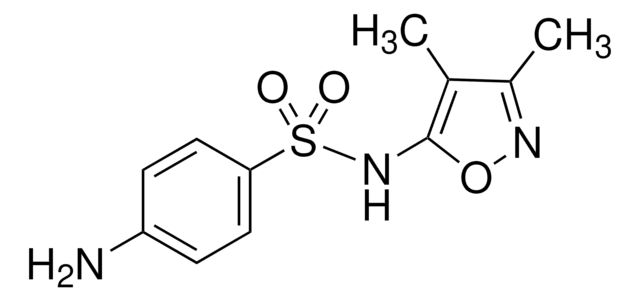31737
Sulfamethoxazole
VETRANAL®, analytical standard
Synonym(s):
4-Amino-N-(5-methyl-3-isoxazolyl)benzenesulfonamide, N1-(5-Methylisoxazol-3-yl)sulfanilamide
About This Item
Recommended Products
grade
analytical standard
Quality Level
product line
VETRANAL®
shelf life
limited shelf life, expiry date on the label
technique(s)
HPLC: suitable
gas chromatography (GC): suitable
application(s)
forensics and toxicology
pharmaceutical (small molecule)
format
neat
SMILES string
Cc1cc(NS(=O)(=O)c2ccc(N)cc2)no1
InChI
1S/C10H11N3O3S/c1-7-6-10(12-16-7)13-17(14,15)9-4-2-8(11)3-5-9/h2-6H,11H2,1H3,(H,12,13)
InChI key
JLKIGFTWXXRPMT-UHFFFAOYSA-N
Looking for similar products? Visit Product Comparison Guide
General description
Application
- Bovine milk by high-performance liquid chromatography method.
- Pharmaceutical formulations and biological samples by capillary electrophoresis (CE) with end-column electrochemical detection (EC).
Recommended products
Legal Information
Signal Word
Warning
Hazard Statements
Precautionary Statements
Hazard Classifications
Aquatic Chronic 2 - Repr. 2
Storage Class Code
11 - Combustible Solids
WGK
WGK 2
Personal Protective Equipment
Choose from one of the most recent versions:
Already Own This Product?
Find documentation for the products that you have recently purchased in the Document Library.
Customers Also Viewed
Our team of scientists has experience in all areas of research including Life Science, Material Science, Chemical Synthesis, Chromatography, Analytical and many others.
Contact Technical Service












